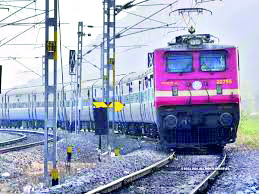‘IR enhances safety with ‘Kavach’, over 1K RKM covered and progress made on major corridors’

New Delhi: To enhance railway safety and address recent criticisms over train accidents and derailments, the Indian Railways has made significant progress by deploying the indigenously developed Automatic Train Protection (ATP) system, known as ‘Kavach’.
As of October 2024, Kavach has been deployed on 1,548 route kilometres (RKM) on the South Central and North Central Railways. Work is underway on the Delhi–Mumbai and Delhi–Howrah corridors, covering approximately 3,000 RKM, with trackside works completed on about 1,081 RKM and regular trials being conducted.
The progress of key components of the Kavach system up to October 2024 includes the laying of 4,960 km of optical fibre cable, installation of 378 telecom towers, provision of Kavach at 381 stations, equipping 482 locomotives with Kavach and installation of trackside equipment on 1,948 RKM. These efforts are part of a comprehensive strategy to create a robust safety net for railway operations.
The next phase of Kavach implementation is already planned, with a project to equip 10,000 locomotives finalised. Bids for trackside works covering approximately 15,000 RKM have been invited, with bids for about 9,000 RKM already opened. This phase includes all Golden Quadrilateral (GQ), Golden Diagonal (GD), High-Density Network (HDN) and other identified sections of Indian Railways.
Railway minister Ashwini Vaishnaw, on Wednesday, addressed an unstarred question by Trinamool Lok Sabha member Abhishek Banerjee in the Lower House of Parliament, highlighting the significant strides made in enhancing railway safety with the deployment of Kavach. This technology, certified to the highest safety standards (SIL-4), is designed to assist loco pilots in maintaining speed limits and automatically applying brakes if the pilot fails to do so, ensuring safe operations even in adverse weather conditions.
To increase capacity and scale of implementation, trials and approval of more Original Equipment Manufacturers (OEMs) are at different stages. Specialised training programmes on Kavach are being conducted at centralised training institutes of Indian Railways, in collaboration with IRISET. Over 9,000 technicians, operators and engineers have been trained in Kavach technology so far.
The cost for the provision of trackside and station equipment of Kavach is approximately Rs 50 lakh per km and the cost for equipping locomotives with Kavach is around Rs 80 lakh per loco. The funds utilised on Kavach works so far amount to Rs 1,547 crore, with an allocation of Rs 1,112.57 crore for the year 2024-25. Requisite funds are made available as per the progress of works.
The journey of Kavach began with its first field trials on passenger trains in February 2016. Following extensive testing and an Independent Safety Assessment by an Independent Safety Assessor (ISA), three firms were approved in 2018-19 to supply Kavach version 3.2. By July 2020, Kavach was officially adopted as the National ATP system.
The implementation of Kavach involves several key activities, including the installation of Station Kavach at every station and block section, RFID tags along the track length, telecom towers, optical fibre cables, and Loco Kavach on every locomotive. These components work together to create a comprehensive safety net for railway operations.
In a significant development, Kavach version 4.0 was approved by RDSO on July 16, 2024. This latest version includes major improvements such as increased location accuracy, enhanced signal aspect information in larger yards and direct interfaces with existing electronic interlocking systems. These enhancements have paved the way for large-scale deployment across various railway routes.
The deployment of Kavach marks a significant milestone, showcasing the country’s capability in developing and implementing advanced railway safety technologies.



